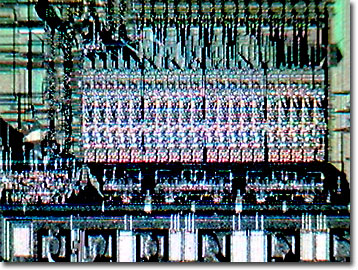Integrated Circuit Image Gallery
NEC V20 Microprocessor
The NEC V20 was Nippon Electric Company's (NEC) first venture into reverse-engineering an Intel microprocessor chip instead of licensing the designs, as was common practice in the 1980s. The move heralded the beginnings of a surge in Japan's now-giant semiconductor industry. The NEC V20 was directly interchangeable with Intel's 8088 microprocessor line, and featured a die having 29,000 transistors and a clock speed of 8 to 10 MHz. Due to the complete pin and signal compatibility, and an Intel 8088 simulation mode, some computer users exchanged their 8088 microprocessors for the newer and faster NEC chip. Sony also produced this microprocessor under license from NEC as the V20H.

View a medium magnification image of an NEC V20 processor.
View a high magnification image of an NEC V20 processor.
Although the NEC chips use the same set of commands as their Intel counterparts, they are not identical. With over 75 percent of the microcode re-written, the V20 translated into a more efficient microprocessor having as much as a 30-percent increase in speed. NEC Technologies also developed the V30 chip, a compatible improvement to Intel's 8086 microprocessor. Even with the enhancements, a system running on a NEC V20 is 50 times less powerful than a modern entry-level personal computer, making the chip obsolete for most applications. However, new life has been provided for these old chips in low-powered portables such as the Hewlett-Packard palmtops operating at a 5.4 MHz clock speed and running the far-outdated DOS 5.0 operating system.
Contributing Authors
Omar Alvarado, Thomas J. Fellers and Michael W. Davidson - National High Magnetic Field Laboratory, 1800 East Paul Dirac Dr., The Florida State University, Tallahassee, Florida, 32310.
BACK TO THE INTEGRATED CIRCUIT IMAGE GALLERY
BACK TO THE DIGITAL IMAGE GALLERIES
Questions or comments? Send us an email.
© 1995-2025 by Michael W. Davidson and The Florida State University. All Rights Reserved. No images, graphics, software, scripts, or applets may be reproduced or used in any manner without permission from the copyright holders. Use of this website means you agree to all of the Legal Terms and Conditions set forth by the owners.
This website is maintained by our
Graphics & Web Programming Team
in collaboration with Optical Microscopy at the
National High Magnetic Field Laboratory.
Last Modification Friday, Nov 13, 2015 at 01:19 PM
Access Count Since September 17, 2002: 15033
Visit the website of our partner in introductory microscopy education:
|
|
